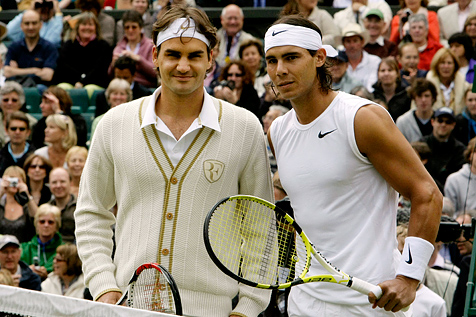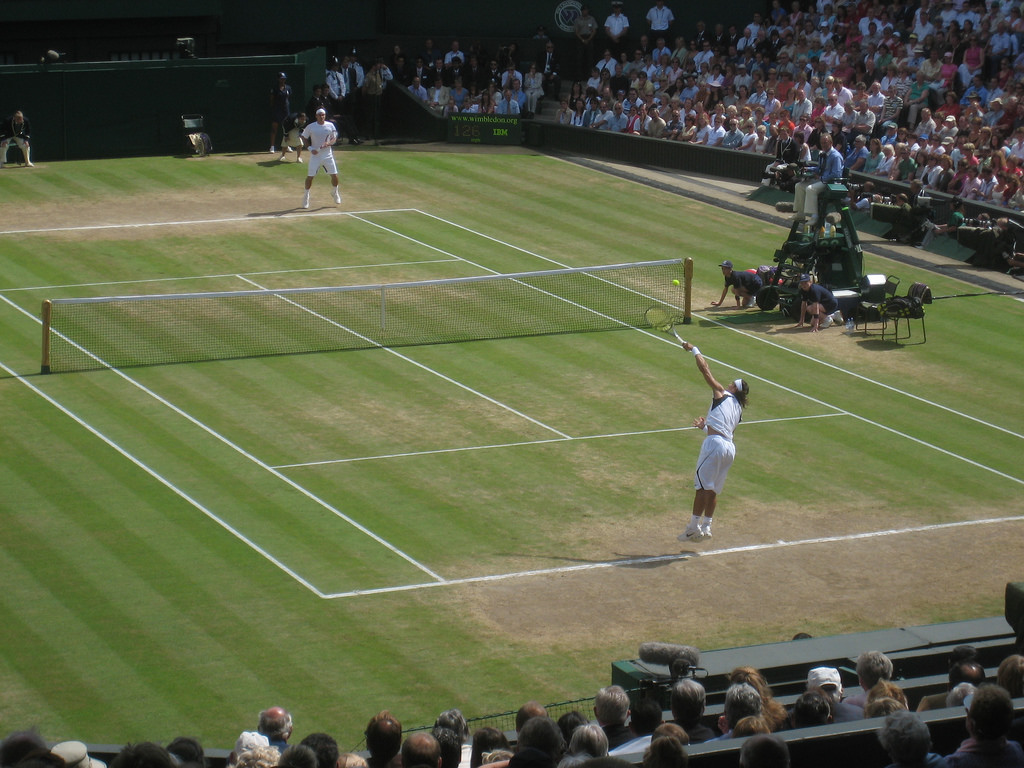The date was July 6, 2008.
I sleepily crawled out of bed at 9 a.m. to watch the men's final of the Wimbledon Tennis Championships.
If you are a tennis fan, then you probably remember this match. It is widely considered the greatest tennis match of all time.
What made it great? Well, it pitted Roger Federer, widely regarded as the greatest of all time, against Rafael Nadal, his main nemesis. Their rivalry is one of the best in tennis, for many reasons.

Stylistically, Federer's choice to warm up in a cardigan gained him the support of upper class white men worldwide.
Image Credit
Federer had won the previous five Wimbledon titles, and had beaten Nadal in the previous two finals there. Nadal, however, had just beaten Federer badly in the French open (clay being the one surface that Federer had extreme difficulty beating Nadal). Many speculated that it was Nadal's turn to win Wimbledon, and possibly the end of Federer's reign of dominance over men's tennis that lasted half a decade.
Things started out well for Nadal, he broke Federer once to take the first set, then after being down a break in the second was able to break Federer twice to win the set (a "break" is when you win the opponent's service game in tennis. On grass courts breaks of serve are rare since the server has such an advantage).
Neither player was able to break serve in the third set, so it went to a tiebreak, which Federer won handily. The fourth set went to a tiebreak again, which Federer won, but had to save a match point with one of the best one-handed backhand down-the-line passing shots there ever was.
Just like that, it was tied at two sets all. Could Federer come back from two sets down and get his record sixth straight Wimbledon? In deciding sets at Wimbledon, there are no tiebreaks, so a player must break his opponent's serve to win. Neither player could do that until 7-all in the 5th set, when Nadal broke Federer's serve and then served the match out to win his first non-French Open grand slam title.

"Lefty serve to Fed's backhand? Don't mind if I do." -Nadal
Image Credit
As a Federer fan, I was crushed. I really wanted to see him win 6 straight Wimbledons and continue to shatter records. I wasn't ready for the Federer era to be over, and I really didn't want the Nadal era to begin.
Many thought it was a time of change in tennis, that Federer's reign was over and that he would start to fade into the sunset. Well, he would go on to win 5 more grand slam titles (which gives him 17 in total, the most of all time), and eight years later he is still in contention, having been to 3 grand slam finals in the last two seasons (losing all three to Novak Djokovic).
What made the Federer-Nadal rivalry so special was that they had very different playing styles. Now, their styles didn't contrast as much as some rivalries of the past, but in modern tennis they were about as different as you can get (the modern game has come to favor baseline play, preventing a pure serve-and-volley strategy from being successful).
Federer is a very precise player. He works his opponents around the court through carefully placed shots so that he can gain an opening in the rally and hit a screaming winner with his sensational forehand. His style of play works especially well on fast surfaces like grass and certain hard courts.
Nadal is a textbook "clay court" player. He hits more conservatively placed shots and lures opponents into long rallies. His excellent defensive skills make it difficult for players to hit winners, which leads them to either lose a point from a missed shot, or just because they simply lose the will to keep trying. "Clay court" tennis places a greater emphasis on an athlete's physical and mental toughness, since the only way to win is basically to outlast your opponent.
I've always loved to watch Federer because the way he plays is just so beautiful. I attribute it to an artist painting a masterpiece. The one word you can always use when describing the way Federer plays tennis is effortless. His strokes, his movement around the court, everything is so precisely timed and executed, like a finely crafted Swiss watch (he is, after all, Swiss).
The Love Of Precision Playing
The dichotomy of "brute force vs. precision" is to some degree the athletic equivalent of "brains vs. brawn". I've always loved watching precision players because it just almost seems like they are cheating. It's as if they are an expert hacker that has discovered a "bug" in the rules of the sport, a loophole that they are able to exploit with their excellent technical skills. In a sport like tennis, there are gaps on the court that almost no player can cover. Trying to hit to these gaps is considered a "bad" strategy, as it is very risky. A select few players can, however, employ this strategy to great effect, and seeing it in action can be breathtaking.
I was reminded of the Federer-Nadal match a few weeks ago while watching the NBA finals. I don't consider myself a basketball fan, but I gained something of an interest in the sport this year while watching some highlights of the spectacular season that the Golden State Warriors had.
The amount of dominance that Golden State showed, helped along by Steph Curry's exceptional 3-point shooting, was second to none this past season. They broke the NBA record for most wins in a season, previously held by the 1996 Bulls (led by none other than Michael Jordan). In the finals, however, they lost to a Lebron-led Cavaliers team.
In my mind, the NBA playoffs this year were unnecessary. Golden State was obviously the best team, and the fact that they had to win several rounds of playoffs to prove it seemed absurd. But don't get me started on the pointlessness of playoffs in sports that have an excessive number of regular season games (but stay tuned for a future post on that).
Nonetheless, Golden State blew a 3-1 game lead in the finals and Lebron was able to get his ring with the Cavs (after winning 2 with the Heat). I'm still a little surprised Cleveland welcomed him back with open arms, since I consider what he did analogous to a spouse leaving you for someone else, having some fun, then deciding to come back and settle down with you. It's a tad pathetic to welcome them back with open arms, but then again, it is Cleveland.
I'm not an expert basketball analyst, but it seemed to me that the Cleveland-Golden State series somewhat mimicked the "brute force vs. precision" nature of the Federer-Nadal rivalry. Steph Curry, along with some of the other Golden State players, lacked the size and physicality usually present among pro basketball athletes, but made up for it with extremely precise shooting ability and sick ball handling skills. Lebron, on the other hand, is a beast, but doesn't sink 3s with quite the regularity that Steph does.
In watching the final series, it was pretty apparent that Steph and the rest of Golden State weren't playing with the precision they had during the regular season. Possibly because they were tired after a long and grueling season, and many will probably speculate if going for the regular season win record was a good idea. In my mind, though, perhaps the gravity of the situation finally got to them.
Pretty, But Fragile
The problem with a precision approach to sports is that playing with precision relies on total fluidity of the body. To clip a line with a tennis shot or sink a 3-pointer in basketball requires that every muscle in the body works in complete harmony and that the brain fires the right neurons at just the right times. Any problem, no matter how small, with the exchange between brain and body can mean the difference between success and failure when you play with small margins of error.
This approach can still be effective with highly trained athletes who practice the motion repeatedly, but has been shown to break down when the stakes are high, i.e. a championship game. The problem is that any athlete, no matter how mentally tough, is still human, and the gravity of the situation has been known to cause "tightness". Anyone who has ever played sports (especially more mental ones like golf) knows what tightness feels like. It's that small amount of tension that usually starts with your grip and propagates throughout your body, caused by the fear of failure.
When humans undergo psychological stress, such as that experienced when we fear losing a game, our natural reaction is to tense our muscles and initiate the "fight or flight" response. This response is useful for things like, well, fighting or running, but not so good for motor skills, such as those required to hit pinpoint shots in many sports.
With this in mind, it makes sense that precision players will have a harder time succeeding when the stakes are high, as their style is more susceptible to tightness. "Brute force" players, on the other hand, have a style that sets up well for high stakes situations, as the increased psychological stress can actually improve their athleticism.
In American Football, there is a common adage that "defense wins football games," which has been seen time and time again when a team with a beautiful and "unstoppable" offense (usually reliant on a precision passing attack) gets shut down by a team with a good defense.
It's often said that the best defense is a good offense, but maybe we should start saying that the best offense is a good defense.
So does that mean everyone should adopt a "brute force" approach to sports? Not necessarily. If you want to be good at a sport, you must honestly assess your physical strengths and weaknesses. Some people have natural abilities when it comes to coordination, others have natural abilities when it comes to strength and/or stamina. You must find out what your natural inclination is, and then gear your training and game plan towards that.
While precision players may have a natural weakness when it comes to high pressure situations, they have strengths when it comes to playing longevity. Because precision styles are built around using skills above physicality, precision players usually tax their bodies much less during gameplay. This means that precision players usually have longer athletic careers and encounter fewer injuries than their brute force counterparts. It's not always the case, but can be seen empirically at least in the Federer-Nadal rivalry, as Nadal's career has been hampered by various injuries due to his playing style. Federer, on the other hand, has enjoyed a long and nearly injury-free career that has been attributed to his playing style.
If you fancy yourself as a precision player, then you will need to spend extra time honing your skills and mental toughness. Usually in competition, you are only as good as your worst shots, so make sure that even your worst will still get the job done.



A+
Pingback: Statistical Analysis for Why Baseball Should Not Have a Playoff